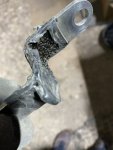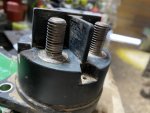Ronmar
Well-known member
- 4,489
- 8,407
- 113
- Location
- Port angeles wa
I only glanced at this, and mainly read your description and missed the low current. I agree with Lostchain, that this does not make sense.
alternators do NOT control current, only voltage.voltage in relation to a batteries state of charge in turn controls current delivered. When an alt cannot deliver enough current to satisfy the load, the voltage drops.
Yes the batts should have been drawing more current, the current a battery draws is dependent upon the voltage it is presented. I did not note where you were measuring the voltage, but since you were seeing more than adequate voltage to deliver full current into a battery, thirsty 100AH AGM batts should have been drawing ~45% of their AH rating.
this speaks to me of a bad connection between where you were measuring voltage and the batts, or bad/sulphated batteries. do these batteries pass a CCA load test? I suspect you were measuring voltage at the alt? Did you also measure voltage AT the batteries, and was it near the 28V you measured elsewhere(within 3%). A larger than 3% voltage drop would indicate bad wiring/connections… A connection with enough resistance to drop from the high 14 and 28v you were measuring to down to just slightly above the 24.8v resting voltage of the batteries which would limit the current draw of the batteries... not a fan of jumper cables. Got any better wire and connectors to try this test again?
alternators do NOT control current, only voltage.voltage in relation to a batteries state of charge in turn controls current delivered. When an alt cannot deliver enough current to satisfy the load, the voltage drops.
Yes the batts should have been drawing more current, the current a battery draws is dependent upon the voltage it is presented. I did not note where you were measuring the voltage, but since you were seeing more than adequate voltage to deliver full current into a battery, thirsty 100AH AGM batts should have been drawing ~45% of their AH rating.
this speaks to me of a bad connection between where you were measuring voltage and the batts, or bad/sulphated batteries. do these batteries pass a CCA load test? I suspect you were measuring voltage at the alt? Did you also measure voltage AT the batteries, and was it near the 28V you measured elsewhere(within 3%). A larger than 3% voltage drop would indicate bad wiring/connections… A connection with enough resistance to drop from the high 14 and 28v you were measuring to down to just slightly above the 24.8v resting voltage of the batteries which would limit the current draw of the batteries... not a fan of jumper cables. Got any better wire and connectors to try this test again?
Last edited:

















